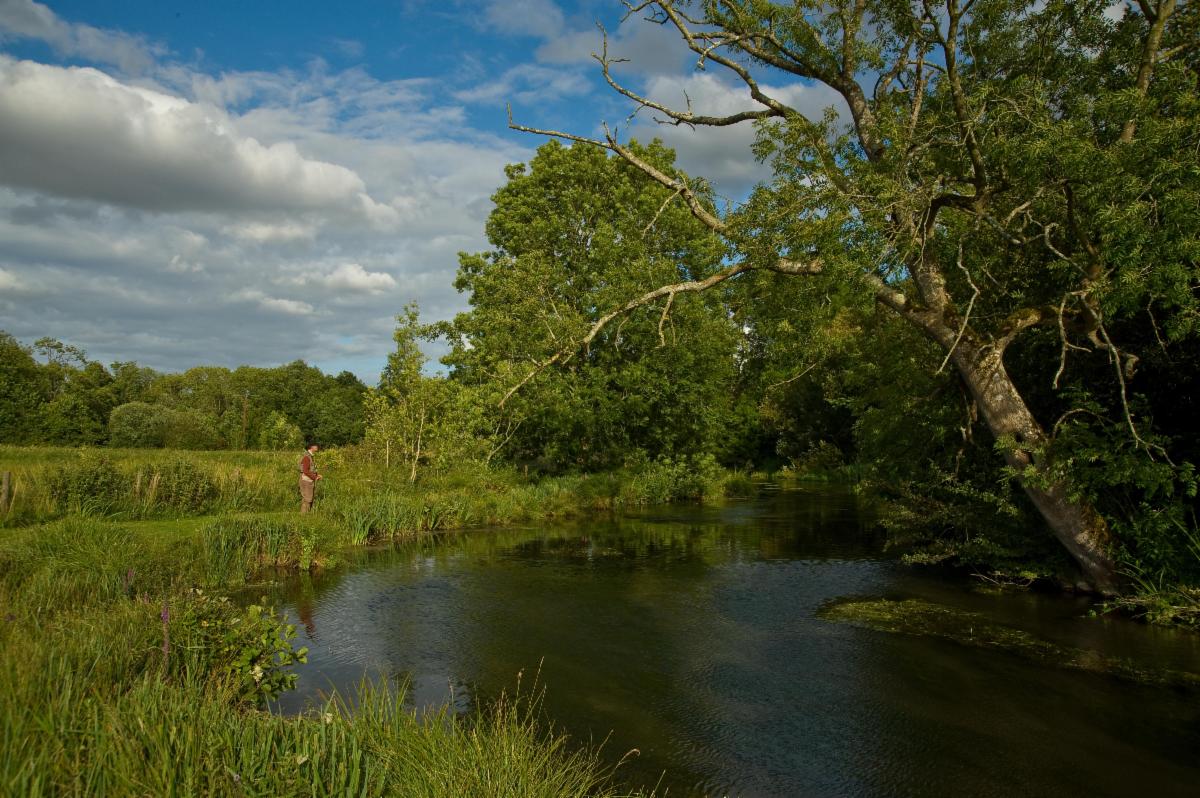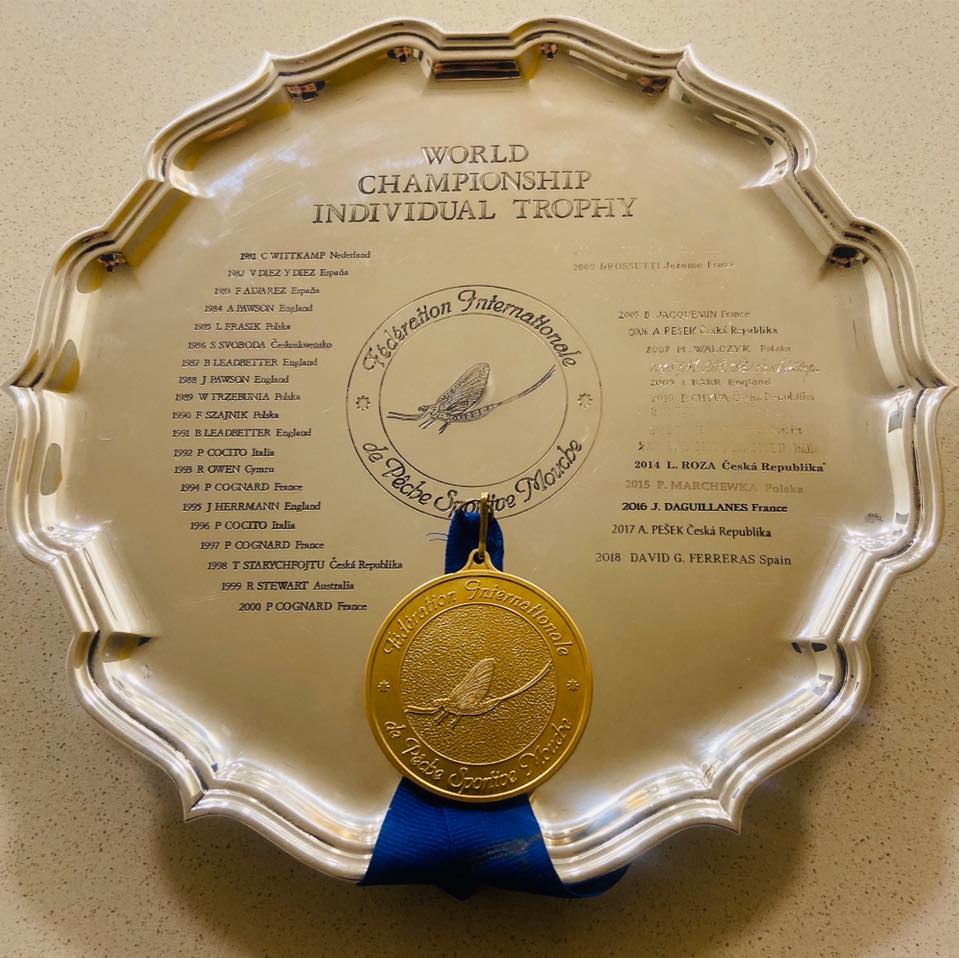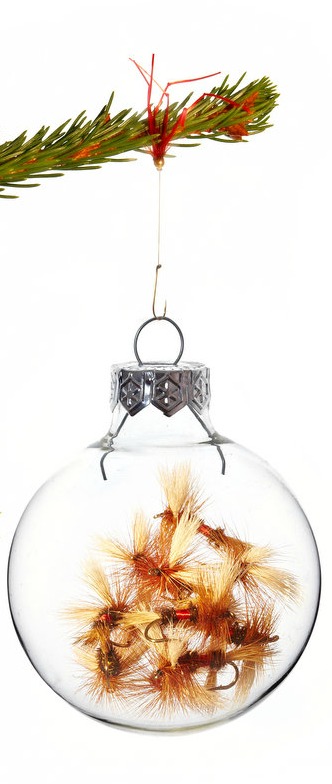|
|||||||||||
|
|
|||||||||||
Friday, 20 December 2019
A different kind of Christmas
Friday, 6 December 2019
Earthly bounty
Earthly bounty
We've been
back at our lake pumping again here at Nether Wallop Mill, picking up where we
left off in February when our rather ancient pump c. 1960 vintage died. This
time we have a state-of-the-art version that purrs rather than deafens, using
as much fuel in a week as the old one did in a day.
|
|
 |
|
|
Kris (l) & Simon (r) preparing for a day
of pumping
|
Pumping is
a pretty laborious process. Firstly, the piping is incredibly heavy and
difficult to move around. The discharge pipe is not too bad, a bit like an
overly large fire hose. But the suction pipes are stiff, moulded heavy rubber
with unruly attachment clamps that have a tendency to bite fingers. These you
have to manoeuvre around the lake, hence the floating platform. In your dreams
you might hope to simply dump the pipe in the lake, leaving it sucking away for
as long as it takes.
In reality,
the syphon head only has an effective range of a few inches, so it has to be
constantly moved amongst the silt that has amassed at the bottom of the lake,
churning it up to create an output the consistency of thin gravy. Of course, it
is not just silt in the 2-3-foot thick layer. Decades of woody debris regularly
conspire to block the head which has to be lifted clear of the water to be
cleared by hand. This is inevitably accompanied by much shaking of heads and
sucking of teeth by both Simon and Kris who have suffered torrential rain and
sub-zero temperatures during the course of the past ten days.
Aside from
the sheer labour involved the other great difficulty with silt pumping a lake
is what to do with the tens of thousands of gallons of dirty water produced
each day without causing upset to your neighbours. In our case we create a
lagoon with a bund of straw bales in what was, a century ago, the water
meadows. By slowing the pace of the water as it makes its way towards the
Wallop Brook the silt settles amongst the raggedy grassland, the bales acting
as the final filter.
The silt,
which slightly resembles an arid, cracked desert lake as it spreads out, has
provided a veritable smorgasbord for the local population. At night the otters
trail across in search of amphibians and bull heads; I even saw fox prints but
quite what he was after I have no idea. Probably just following in the
footsteps of the otters. They have become quite competitive of late with the
fox stealing a trout off one of the otters a few nights ago. By day it is bird
city; egrets, herons and kingfishers all digging into the feast in their
various different ways.
All I have
to do now is persuade Mr. Mole to relocate from my lawn and we'll all be happy.

Reely?
I do
sometimes wonder what manufacturers think motivates us fly fishers. Now, I
covet fly fishing reels as much as anyone. They are the bling of fishing.
|
|
 |
|
|
I have some
absurd specimens that I have bought regardless of cost and utility. They might
be useless for the intended purpose, but we don't love them any the less.
But I do
truly struggle to understand the latest $1,355 offering from Abel. The AC/DC
reel.
I have
criss-crossed the CV of this hard rock/heavy metal band but have yet to find
any reference to any of the assorted members, alive or dead, showing any
interest in fly fishing.
However,
with 200 million album sales to their name I guess they have a massive
following and I may well have to eat my words when each of the 300 limited
edition becomes a collector's item.
Google
alerts
I have a
Google news alert that trawls the internet for news items of interest flagged
by the various key words I have chosen; it is something of a mixed blessing.
 Clearly, I
have the obvious ones such as chalkstream and fly fishing. At the risk of appearing
a narcissist I have Simon Cooper which occasionally leads me to learn stuff
about myself I never knew.
Clearly, I
have the obvious ones such as chalkstream and fly fishing. At the risk of appearing
a narcissist I have Simon Cooper which occasionally leads me to learn stuff
about myself I never knew.
It is also,
annoyingly, the name of a court reporter for the Press Association so I know a
great deal about the activities of petty criminals across the breadth of
Britain. Not to mention the troubles of holiday operator On The Beach who's CEO
is a Simon Cooper. However, it is The Otter's Tale that generally brings up the
weirdest stuff.
Surprisingly,
book titles are not, in most circumstances, copyrightable. This turned out to
be a great help when we found out, just a few weeks ahead of my publication, that
Gavin Maxwell had published a children's book of the same name. Soon after my
Otters' Tale was followed by another, this time a sex novel about a guy called
Otter. And then not long after a Christian publication. However, it seems the
title remains a deep seam for up popped last week another Otter's Tale, this
time in TV advert format by the luxury handbag maker Loewe.
It hasn't
exactly received many plaudits; it has a low approval rating of 1 compared to 5
for the latest John Lewis Christmas ad but I'll leave you to be the judge as it
is, to say the very least, a little weird. I have no idea what they are on
about. Watch it here ........
More mayfly
mystery explained
Most years
during the height of the mayfly hatch I will come across the strange sight of
Danica dancing above a tarmac road, pointlessly fulfilling their appointed
destiny by diving down to lay eggs on the road surface.
|
|
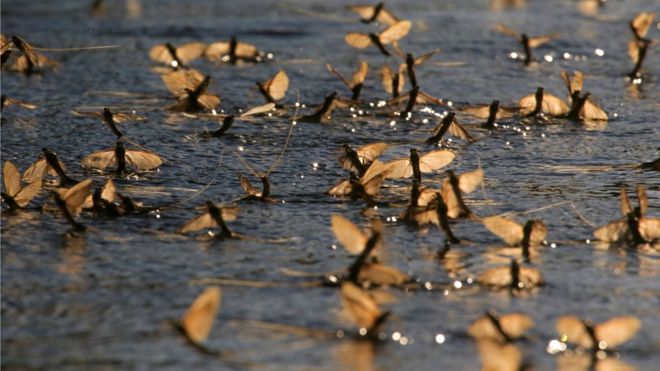 |
|
|
Mayfly on the Tisza River in Hungary
|
I have
often wondered why assuming, mistakenly as it turns out, the wet or shiny
surface in some way resembled a river surface.
However, a
comprehensive review of the scientific evidence to date into light pollution as
a driver into the rapid decline of insect populations has provided an unlikely
explanation. Some insects use the polarisation of light to locate the water
they need to breed and as Brett Seymoure, a behavioural ecologist at Washington
University in St Louis and senior author of the review explains, "Mayflies
live for only one day, so they come out and look for polarised light. They find
it - but from asphalt - lay their eggs there, and they all die. That's a good
way to knock out an entire population in 24 hours."
On the
topic on mayflies, David Attenborough's latest series Seven Worlds One
Planet featured a monstrous hatch of mayfly on the Tisza River in Hungary.
These seem to be larger and thicker in body than our own, almost more moth than
mayfly. The hatch is also faster and more furious than our own, the males just
living for three hours the mass mating (up to seven males to one female) taking
place in the surface of the river. The spent males are left to die as the
females migrate upstream for three miles to ensure that as the eggs (and
presumably nymphs) drift downstream over the next three years they will hatch
in the self-same place they were born.
You can see
the five-minute section on BBC
iPlayer. It is episode five of the seven-part series.
Quiz
No theme
this week other than tangentially the Newsletter topics and the small matter of
next Thursday. As ever the quiz is just for fun, with answers at the
bottom of the page.

1) What is the
name of the biggest selling record album of all time?
2)
What
is Boris Johnson's full name?
3)
What
was Google's original name?
Have a good
weekend.
Best
wishes,
Simon Cooper simon@fishingbreaks.co.uk
Founder & Managing Director
Answers:
1) Counting
methodology is disputed so if you said Thriller (Michael Jackson) or Greatest
Hits 1971-75 (Eagles) take a point. AC/DC Back in Black in somewhere
in the top ten.
2)
Alexander
Boris de Pfeffel Johnson
3)
BackRub
Friday, 22 November 2019
The truth about flooding
The truth about flooding
We seem to
be getting into a strange mindset about our climate, the passage of time
muddling how we recall decades past. Apparently, there was a time when Mother
Nature strictly obeyed the Gregorian calendar allotting sun, shine, rain, snow
and wind to precise months each year, the famous British obsession with the
weather simply being a reflection of the uniformity of our weather patterns.
Not.
 A drier
than average summer? A wetter than average autumn? As the French would say,
merde! If you care to Google the history of freak weather events in Britain
you'll see they are far from being 'freakish'; there is something that caused
death and destruction at least every ten years going back as long as records
exist.
A drier
than average summer? A wetter than average autumn? As the French would say,
merde! If you care to Google the history of freak weather events in Britain
you'll see they are far from being 'freakish'; there is something that caused
death and destruction at least every ten years going back as long as records
exist.
I have a
book on my shelf that charts the history of Hampshire (hardly a county you'd
classify as cyclone alley) weather since photography began; you'll find
snowdrifts in June and flooded streets in August. All of a sudden as we enter
the third decade of the twenty first century, we seem to be surprised about
this. But we shouldn't.
Humanity
has long gravitated towards the areas most likely to flood; the convenience of
living beside a river trumping the risks associated with living beside a river.
The masses be they in cities, towns or villages huddled along the banks because
they essentially had to. But in modern Britain we have no such need but still
we do it. In the past twenty years 250,000 homes have been built in flood risk
areas. Of those 68,000 are in zones where flooding is anticipated at least once
in every 100 years and of those 23,000 are in areas expected to flood every 30
years.
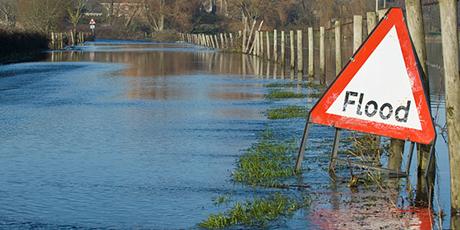 And so, we
have to deal with a problem of our own making, rivers becoming the unwitting
victims of the urbanisation of the river catchments, those very regions that
Mother Nature designed to collect rainfall over a natural drainage area. The D
word comes around again. Dredging. But it is hardly a solution, in most cases
the volumetric equivalent of forcing the output of a fire hose into a garden
hose. For dredging has rarely ever been about the instant solution to flash
floods but rather the management of agricultural land that works over a cycle
of weeks at best but more generally months.
And so, we
have to deal with a problem of our own making, rivers becoming the unwitting
victims of the urbanisation of the river catchments, those very regions that
Mother Nature designed to collect rainfall over a natural drainage area. The D
word comes around again. Dredging. But it is hardly a solution, in most cases
the volumetric equivalent of forcing the output of a fire hose into a garden
hose. For dredging has rarely ever been about the instant solution to flash
floods but rather the management of agricultural land that works over a cycle
of weeks at best but more generally months.
As Kevin
Costner famously says in the epic sporting film Field of Dreams: if you
build it, they will come. Sadly, that has turned out to be true.
Salmon
statistics
One of our
guides, a keen salmon fisher, sent me a copy of the catch return you are
required to submit to the Environment Agency. He did it not to boast of his
fishing prowess but rather to highlight the 2018 statistics the EA list in the
top right-hand corner of the form. It makes for depressing reading:
- 31,655 licences
sold
10% decrease on 2017
- 106,085 days
fished
34% decrease on 2017
- 7,778 salmon
caught
43% decrease on 2017
- 13,661 sea trout
caught
38% decrease on 2017
88% of salmon and 85% of sea trout
were released. It is hard to put any good spin on any of this data other than
to say that we are optimists all: that is one salmon for every fortnight of
fishing!
Fancy a record grayling?
February is traditionally
themonth the big grayling come out to play, no doubt in anticipation of the
impending spawning season. Earlier this year this old adage proved to be more
than true when one of John Bailey's party at the Ilsington on the River Frome
set the new British record.
|
|
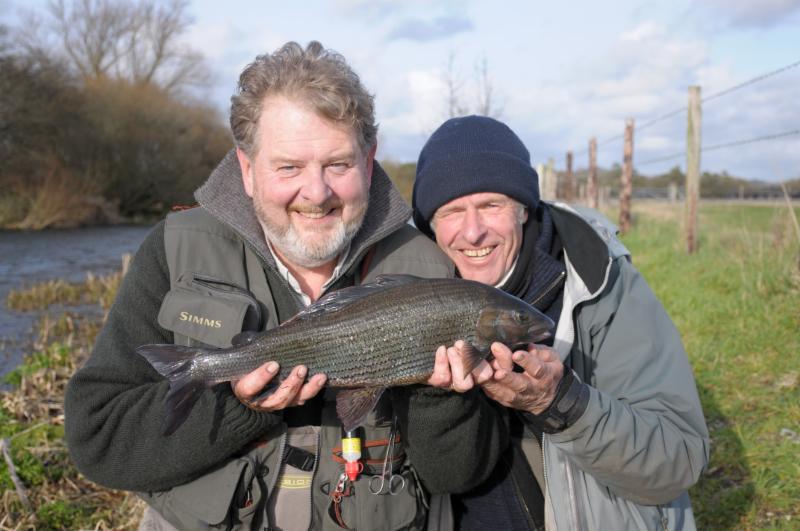 |
|
|
Simon Ellis (l), John Bailey (r) and 'the
fish'
|
Can lightening strike twice? Well,
yes and no as another new record this coming February would in fact be the
fourth time a British record has been captured at Ilsington. You can, of course
but a day ticket any time, but with John Bailey at your side, one of the most
accomplished anglers of our generation, I think it is fair to say your chances
multiply dramatically.
Join John on either February 21st
or 22nd. More
details here .....
32 fishing days to Christmas
For the dedicated,
the-just-starting-out or simply the occasional dabbler there's a gift voucher
out there that might just make the perfect Christmas gift.
The ultimate in just-go-fishing
that can be diced and sliced to be used any time over the next two years,
though don't expect it to remain unused for that long!
Choose a day on the River Test or
sign up for the Chalkstream Course
Courses and private tuition here at
Nether Wallop Mill
Fishing should not just be for Dad!
Family Days, Kids Camp and much more.
Join me for my summer River Walk to
the famous landmarks on the River Test.
Order vouchers online,
by email or phone. Vouchers are
mailed the same day, in a discreet envelope and are valid for 2 years.
Quiz
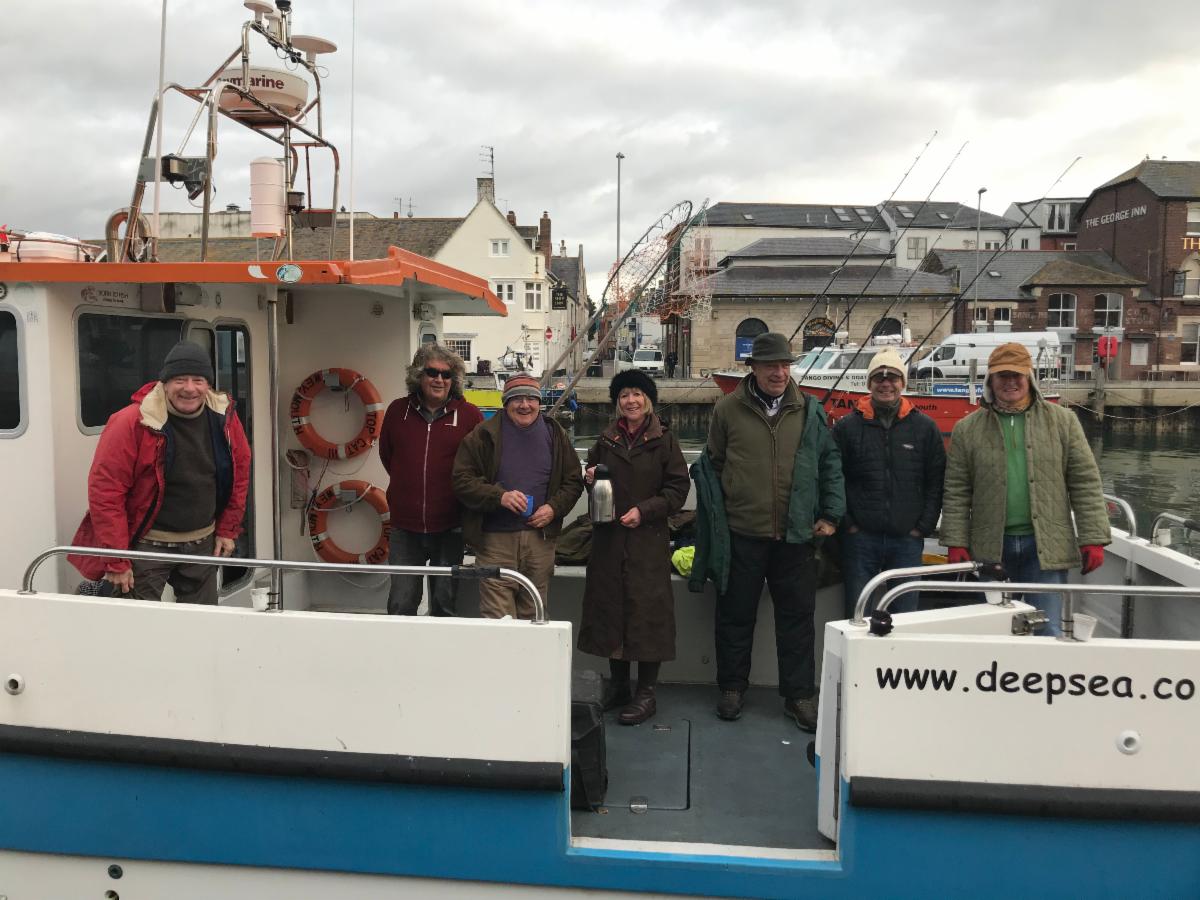 Fishing
Breaks went sea fishing out of Weymouth Harbour on Tuesday - well, what else
would we do for our Christmas party?!
Fishing
Breaks went sea fishing out of Weymouth Harbour on Tuesday - well, what else
would we do for our Christmas party?!
With that theme a few saltwater
related questions this week. As ever the quiz is just for fun, with answers at
the bottom of the page.
1)
Xiphias gladius is the Latin name for which fish?
2)
Which
fish is known as the Poor man's lobster?
3)
The
name of which fish comes from the old French word for spinning top?
Have a good weekend.
Best wishes,
Simon Cooper simon@fishingbreaks.co.uk
Founder & Managing Director
Answers:
1)
Swordfish
2)
Monkfish
3)
Turbot
Subscribe to:
Posts (Atom)
